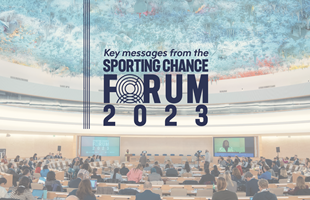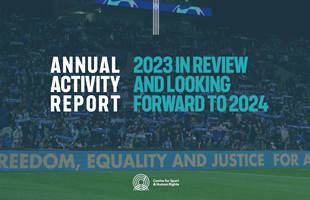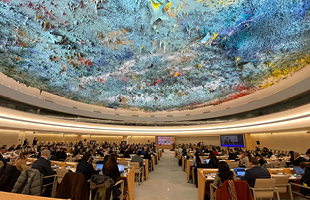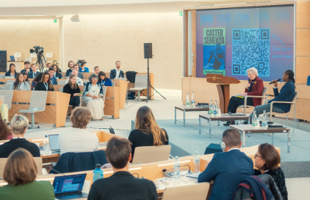Reflections on the Sporting Chance Forum 2019
10 Dec 2019
Author - Centre for Sport and Human Rights
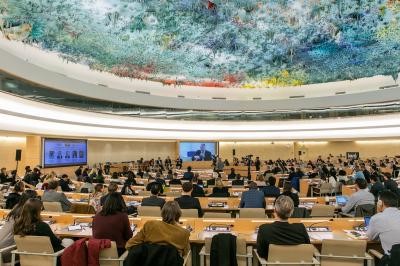
Sporting Chance Forum 2019 Reflections -Áine Power, Deputy Legal Director, FEI (International Equestrian Federation)

The FEI was delighted to have the opportunity to present at the 2019 Sporting Chance Forum and to share our experiences in the area of safeguarding. The collaborative atmosphere at the Sporting Chance Forum allowed us to speak openly not only about the importance of implementing the FEI Safeguarding Policy against Harassment and Abuse but also about the associated challenges and how various International Sports Federations had taken the initiative to set up an informal working group dedicated to the topic.
A key message that emerged from the various presentations on the topic of safeguarding is that we, in the international sports community, have a collective responsibility to act to ensure that everyone who participates in our sport can do so in a safe environment, free from any form of harassment and abuse. This responsibility extends not only to the athletes, but to all those involved in sport, be they officials, administrators, coaches etc.
The 2019 Sporting Chance Forum provided an excellent platform to communicate the dual message that, in general, International Sports Federations are taking the issue of safeguarding very seriously and are committed to implementing change, but recognising that this brings with it many practical, day-to-day challenges in terms of case management, be that from a resource or legal perspective – challenges which should not be underestimated. The effective implementation of a safeguarding policy by an International Sports Federation requires a multi-layered approach and generates complex cross-jurisdictional issues. If we are to succeed in creating a safe environment for those who practice sport worldwide, we need a common, global set of standards/rules, a means to share information on suspensions etc. and mutual recognition of decisions to ensure that those sanctioned by one sport cannot simply change sport and re-offend.
International Sports Federations, like the FEI, want to be part of the solution. Ultimately, much of the work involved in the daily implementation of safeguarding policies in the international sporting context will fall to us as sports federations to implement. Therefore, it is important that policy drafters, researchers and all those prestigious organisations represented at the Sporting Chance Forum involve the International Sports Federations in ongoing conversations on the topic of safeguarding.
Sporting Chance Forum 2019 Reflections - Aaron Smith, Youth Ambassador, National Olympic Committee of Northern Ireland
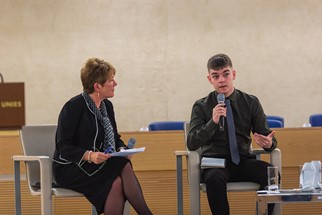
This year´s Sporting Chance Forum was massively eye-opening, providing opportunities for some incredible dialogue and forming excellent foundations for progression in the future.
I was lucky enough to attend, speak and engage with over 300 international delegates from all aspects of sport and human rights. It is important that we as a collective, whether we are sporting bodies, human rights institutions or affected groups, such as myself, can integrate and include each other in what we do. There should be a shared responsibility, there should be accountability, and most of all there should be compassion for one another.
Serendipitously, this Forum has not just landed on the 30th anniversary of the UN Convention on the Rights of Child, as well as the centenary of the ILO. What better turning point for progression in sport and human rights than this? Overall, it is simply rare to be involved in an event such as the Forum, with so many key players, who can genuinely make a difference. This should continue to be the cornerstone of the Centre for Sport and Human Rights.
The admirable inclusion of young people within this event was unique, through both speaking live and through the use of a questionnaire. This provided an incredible insight for many, who I’m sure were also pleased to finally see young people being represented in today’s sporting context. I am so grateful to have been a part of this event and I genuinely hope to return.
Sporting Chance Forum 2019 Reflections - Blanca de la Quintana, Coordinator of Sport for Development, Barça Foundation

The Sporting Chance Forum 2019 was organised by the Centre for Sport and Human Rights and co-hosted by ILO, OHCHR and UNOG at the Palais des Nations in Geneva. Barça Foundation had the chance to attend the event for the very first time and it was a great opportunity to learn from globally relevant organisations and professionals that consider human rights within the sport sector.
The role of sport in respecting human rights is essential. Sport is a global language that can be used as a platform to advocate for human rights globally and position them as indispensable in any action.
However, it is our responsibility to be aware of the impact of our actions. Therefore, as sport sector professionals, we should take the lead and be an example in implementing each human right – from safeguarding protocols to providing national policies that guarantee the implementation of the human rights.
Every panelist was high-level and impactful; however, the panels on corporate partnerships and safeguarding in children were particularly impactful. The corporate partners panel presented an opportunity to join forces and work toward a shared value – the respect of human rights. The combination of knowledge and experience from different actors presented a win-win strategy to achieve the shared goal.
However, in order to make corporate partnership a success, the communication aspect is key. Sharing good practices, knowledge and conclusions, as well as communicating the impact and milestones, will help to position human rights as essential within the sport sector.
Participating in this Forum has confirmed the need to keep fighting for children’s rights, especially in sport, in order to leave no child behind. Every actor has a role and responsibility to guarantee that the practice of any sport respects and promotes human rights under any circumstances. For this reason, Barça Foundation aims to advocate and stand for children’s rights to play sport in a safe space, no matter the physical and social situation. Participating in this Forum has reinforced our commitment to this cause and inspired us to keep fighting for human rights to be respected globally.
Sporting Chance Forum 2019 Reflections - Mirek Krogulec, Director, Sports & Organizational Development, Special Olympics Europe-Eurasia

The Sporting Chance Forum 2019 definitely sent a strong case to over 350 representatives to move forward with the issue of human rights in sport, and outlined solutions needed across all sports.
Hosted by the Centre for Sport and Human Rights, the International Labour Organization, the Office of the UN High Commissioner for Human Rights, and the UN Office in Geneva, the agenda was driven by well selected moderators and panelists from the world of sport, NGOs, business and governments, that made the days’ discussions very dynamic and inspiring.
The Centre for Sport and Human Rights provides a great platform to educate and advise on human rights in sport. I do believe that through cooperation with all International Sports Federations and targeted government representatives, much more can be done to find effective remedy for violations and abuses and to remove the barriers that still exist in sport.
UEFA and FIFA’s work on implementing a Child Right in Sports and Safeguarding policy serves as an inspiration for other sports federation and helps make this issue a priority over the next few years.
The report by Maud de Boer-Buquicchio, the UN Special Rapporteur on the sale and sexual exploitation of children “Playing It Safe”, with its clear recommendations to States and sporting organisations, left a clear message for all on what to do next.
In addition, the Council of Europe with its “Start to Talk” call for action on adults breaking the silence and lending children a voice should be promoted more widely, not only in sports federations, but also to public authorities.
The Youth representatives at the Forum presented a clear, strong and mature voice calling for the elimination of violence and sexual abuse in sport.
Finally, the non-formal lunches to discuss “Child Rights and Sport” provided a good format to express prioritised areas of further work around mega events, raising awareness, reporting, background checks, child voices and others.
From the perspective of Special Olympics, an NGO providing training and competition in 34 sports for over 5 million people with intellectual disabilities in 194 countries, we fully agree that issues related to child rights, bullying and reducing barriers in sports to have more inclusive communities are extremely relevant and timely to our work.
Sporting Chance Forum 2019 Reflections - Dr Sheree Bekker, Prize Research Fellow, University of Bath, UK

Human Rights violations in sport, including intentional violence (harassment and abuse) at both interpersonal and organisational levels, have gained unprecedented visibility in recent years due to a number of high-profile cases and #MeToo-inspired public disclosures. These include, amongst many others, the egregious violence against the Afghan Women’s Soccer team, the US Women’s Gymnastics Team, Sahar Khodayari, Hakeem Al Araibi, Caster Semenya, and Mary Cain. In the context of the #MeToo era, there is a palpable turn in the recognition that sport has the power to be a force for good in society, yet that sport is not always a safe space for everyone.
These examples, amongst others, became the narrative through which the red thread of Human Rights was laced at the 2019 Sporting Chance Forum, organised by the Centre for Sport and Human Rights. The Forum was billed by Mary Harvey (CEO, Centre for Sport and Human Rights), as a space for creating change around four common Human Rights goals for sport: 1) collective action, 2) intentional inclusion of affected groups, 3) engagement with sports organisations and governments, and 4) representation from the Global South. Further, as 2019 marks the 30th anniversary of the UN Convention on the Rights of the Child, the Forum featured a prominent focus on, and input from, children’s voices.
It shouldn’t have come as a surprise, then, that an urgent call to action on what some may still consider an unusual topic at this Forum came from a young person in attendance. Nith Koem, a representative of UNESCO’s Youth and Sport Task Force from Cambodia, made an elegant and urgent case for recognising climate breakdown as a sport safeguarding issue. Connecting with the four common goals as set by Mary Harvey above, youth athletes see the climate crisis as inherently connected to the larger, overarching Human Rights and Sport conversation. Here, I would like to add my voice to this need for acknowledgement and urgent action. It matters.
A second call to action is one that I would like to bring to the table. As an injury prevention and safeguarding researcher reflecting on the Forum, I see a pressing need to engage not only with safeguarding policy and education (which were prominently featured as current approaches to prevention and response), but also to ensure that evidence-informed implementation and evaluation of those measures are par for the course. Currently, measures are too often ad-hoc, responsive, band-aid solutions. What is needed, at minimum, is an explicit, active focus on safeguarding, including evaluating what works, for whom, when, where, why, and how. As Gigi Alford (UNI Global Union’s World Players Association) said: “there is a crisis in sport when it comes to safeguarding”; we urgently need research-informed prevention and response measures that are fit for purpose, and evaluated over time, for better and more effective action. Here I see a pressing need for more long-term, embedded, joined-up thinking across sectors and co-creation with stakeholders, including athletes themselves.
All in all, the 2019 Sporting Chance Forum was an incredible two days holding space for the role of sport in human rights, and human rights in sport. As Michelle Bachelet (High Commissioner for Human Rights, United Nations) noted: “we can and must do better”. I couldn’t agree more. Onward.
Sporting Chance Forum 2019 Reflections - Martin Gibbs, Director, Sport Resolutions
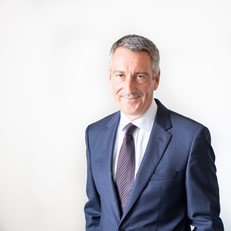
International Federations - welcome to the club!
One of my favorite moments of the Forum was during the panel on Remedying Human Rights Abuses in Sport when Minky Worden of Human Rights Watch reminded international federations that yes, the UN Guiding Principles on Business and Human Rights, and all the obligations they impose, apply to them too, so “welcome” as she said. Also on that panel was Andreas Graf from FIFA to describe his federation’s journey in adopting a human rights policy and then putting in place practical measures to back that policy up at its events and in its daily work.
Given that most federations are yet to start the journey that Andreas spoke about it’s striking to think just how much can be achieved in the coming years as the federations responsible for regulating and delivering their sports every day put in place practical measures to protect human rights. From establishing human rights policies which are meaningful because they are supported by the president and CEO, to putting in place supply chain human rights due diligence, to ensuring the rights of athletes and participants are safeguarded at competition and in training, there’s a lot of work for federations to do. And I think the good news is that when they start doing that work they will find they have more and more good things to say about their sport and that their staff, athletes, fans, national federations, clubs, host cities and sponsors will want to associate themselves with the progress made.
I believe the next few years will see a change in the way that sport deals with human rights on a scale as significant as the revolution that happened twenty years ago in antidoping when we created a common set of rules and standards backed by an independent body, WADA, to help enforce them. Back then a series of crises had shocked sport into completely changing how it dealt with antidoping because we collectively admitted we had a serious problem that threatened the credibility of sport and therefore it’s ability to deliver all the benefits it is capable of. Similarly, sports now need to get focused on how they are all going to individually take responsibility for protecting the human rights of those they affect. It’s another credibility issue.
